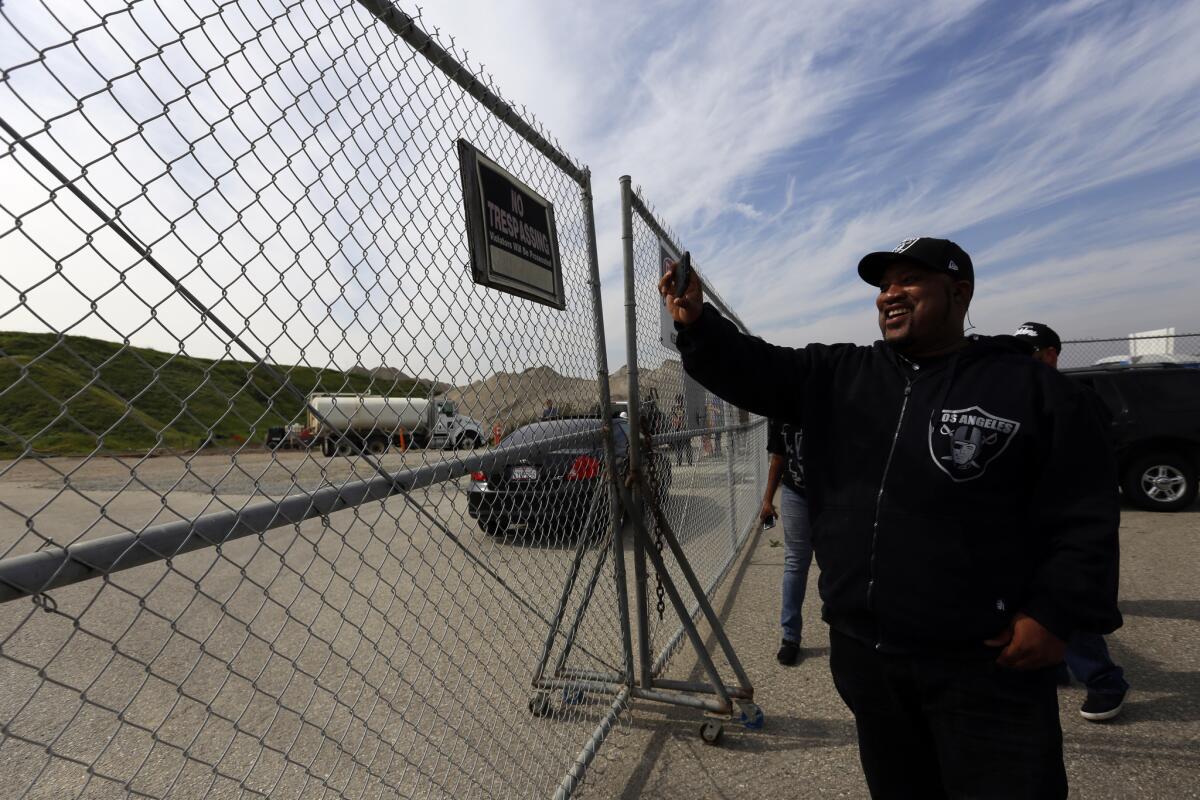NFL says this time it’s more serious about stadium

- Share via
For two decades, billionaires, business leaders, Hollywood celebrities and high-powered politicians have taken turns trying to coax the NFL back to Los Angeles. Their efforts have been futile.
Football fans in the region, fatigued by broken promises and dead-end deals, have been largely skeptical. They’ve revealed their feelings in letters and online posts that can best be summarized: Don’t call us until you start pouring cement.
Now, in the last few weeks, NFL owners have muscled their way onto the stage, throwing in their own money and making their stadium plans very public. For the first time since 1994, the NFL’s return to Los Angeles might be more than a dream.
“People are actually investing dollars into getting something done,” said Pittsburgh Steelers owner Art Rooney II, chairman of the league committee looking into the L.A. market. “People can take that as maybe we’re more serious than we’ve been over the last decade or so.”
The owner of the St. Louis Rams announced last month that he intends to build a football stadium at Hollywood Park in Inglewood, and Thursday the owners of the San Diego Chargers and Oakland Raiders unveiled a plan to share a venue in Carson. Neither proposal requires public money.
“There’s a big difference between the league making something out of a market, and an owner doing that,” said Eric Grubman, an NFL senior vice president and point man on L.A.
“Now that there are multiple clubs in it, the passion is building, and the commitment to get something done on the part of those clubs is very public. That changes the dynamics, and it does increase the complexity.”
No one has yet committed to move a team to L.A. But the owners have made it clear that they are ready to relocate if they are unable to negotiate a new publicly subsidized stadium in their home cities. The stakes are high as they jostle for position in the nation’s second-largest market, where the Dodgers and Clippers each sold for $2 billion or more.
The pressure now is on the NFL to make it work.
“There are some in the league office who would prefer a much more orderly process,” said Amy Trask, former chief executive of the Raiders. “And I also believe that there are others who believe this sort of competition is essential to achieve the sort of resolution that the league wants.”
In the end, the decision on L.A. could drive wedges into a historically cohesive group whose 32-team enterprise generates almost $10 billion in annual revenue. It’s extremely unlikely that two stadiums will be built.
It’s a delicate situation for a league coming off the most turbulent year in its history, when Commissioner Roger Goodell was under intense scrutiny for his handling of star players who found trouble off the field.
The Chargers and Raiders formed an unlikely pairing when their hand was forced by Rams owner Stan Kroenke, who set off the competition when he joined forces with a developer for a stadium on the former Hollywood Park property. The Raiders and Chargers, AFC West rivals on the field, say they are pursuing Carson as a fallback, in case they cannot get sufficient stadium subsidies in Oakland and San Diego.
St. Louis is scrambling to hang onto the Rams, and has proposed a new riverfront stadium that would be about 40% publicly funded.
“It’s fluid because there are multiple sites and multiple clubs,” Grubman said. “The home markets have not yet fully responded to the possibility that their teams might leave.”
If the Rams make a deal to stay in St. Louis, it would take the pressure off the Chargers and Raiders to make an immediate move to seize a share of the L.A. market.
The Chargers and Raiders said they expect to know by the end of this year whether they have workable deals in their home cities.
There has been speculation that Kroenke, the league’s second-richest owner, might decide to move without league approval. Al Davis did it with the Raiders and Robert Irsay with the Baltimore Colts in the early 1980s.
Rooney predicts all three owners would adhere to league rules stipulating that any major decision such as a relocation requires a three-quarters vote of the 32 owners.
“I don’t sense that any owners are taking the position of, ‘I’m going whether you like it or not,’” he said. “We’ve been in contact with all of them. They all are working with our committee.”
Since World War II, every city that has lost an NFL team eventually landed another one — except Los Angeles, which lost the Rams and Raiders after the 1994 season.
There are various reasons given as to why L.A. has gone so long without a franchise. One is the league depends on using the L.A. vacancy as leverage to get stadium deals done in other cities. Since 1995, 27 of the 32 teams have either gotten new stadiums or had at least $400 million in renovations on their existing ones.
Another reason is that while every other city talks about what it will do to either lure an NFL team or keep the one it has, L.A. talks about what it will not do — namely it will not help finance a venue with taxpayer money. Both the Hollywood Park and Carson plans call for privately financed stadiums.
Then there are those who say the league has just been too choosy.
“There’s no one site that’s perfect,” Trask said. “One thing I’ve noted over the years is that the league may have gotten too focused on looking for the perfect site that they passed up the terrific one.”
Twitter: @latimesfarmer
Times staff writer Nathan Fenno contributed to this report.
More to Read
Go beyond the scoreboard
Get the latest on L.A.'s teams in the daily Sports Report newsletter.
You may occasionally receive promotional content from the Los Angeles Times.











